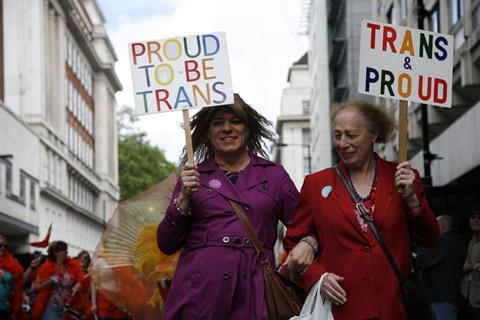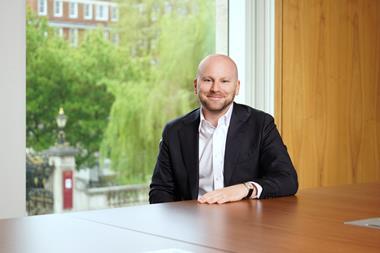This week is Trans Awareness Week as well as Trans Remembrance Day on the 20 November, commemorating the lives of murdered transgender and gender-diverse people.

According to LGBT charity Stonewall, one in eight trans people have been physically attacked at work and just over half have hidden their identity at work for fear of discrimination.
“Businesses can be at the forefront of driving equality in society, creating spaces where customers, employees and the wider LGBT community can be accepted,” says Mark Kember, director of membership operations at Stonewall.
Against this backdrop, what are leading property businesses doing to create accepting spaces for their trans employees – and are they doing enough?
Many property companies already have a policy to support trans employees. JLL launched a policy on transitioning in the workplace at the end of Pride month in 2018.
It has also spent the past two years in talks with its medical care provider, encouraging it to extend cover to those who are transitioning. This has resulted in the company offering cover that includes counselling, assessment with a gender identity specialist and initiation and monitoring of hormone treatment for up to two years.
A spokesperson tells Property Week that this is “in recognition that one of the biggest issues for people with gender dysphoria who wish to transition is the length of time that they must wait to be seen by specialists”.
Creating a support network
JLL project manager Ryden Ravenwood started his transition earlier this year. A support network was created around him including his director, manager, HR and diversity and inclusion manager. He was given the opportunity to speak to a senior member of staff whose son had transitioned. Ravenwood says: “This helped [me] understand the journey. It was wonderful. JLL has a very supportive environment.”
Leng Montgomery, diversity and inclusion lead at Cushman & Wakefield, has had a similarly supportive response from other employees. Montgomery celebrated his 10th trans birthday this year and a colleague bought him a cake. Some people, he says, “literally haven’t batted an eyelid”.
Savills has implemented a trans policy, and trans awareness is included as part of its training in unconscious bias and diversity and inclusion. Noel McGonigle, Savills’ head of HR, says the firm would consider including partial funding of transitioning under its medical policy in future. “We want to keep abreast of what is considered best practice,” he says.
Support also comes in the form of the wider LGBT community in property: Freehold, the LGBT networking forum, has 1,300 members and holds trans awareness events.
However, Freehold has come under scrutiny for not being diverse enough, admits David Mann, its co-chair and executive partner at Tuffin Ferraby Taylor. He accepts that more needs to be done for its trans members: “Freehold acknowledges that we’re not doing enough among ourselves. Our next action plan is to engage with our trans members.”

While Montgomery praises the efforts of individuals both at Cushman & Wakefield and in the wider industry, he believes there is still a long way to go. He knows people in the sector who want to transition “but are too scared to” because of the impact it could have on their job. “This is a legitimate concern,” he says.
He also knows individuals who have been moved to a different department while transitioning – or in one case demoted from director to senior manager.
Things now might be easier for Montgomery in the workplace, but when he transitioned, he received 289 job rejections in a two-year period. Although he is now in a leadership role, he believes it has taken him longer to get where he wants to be in his career than if he had not transitioned.
Liane Smith, a trans employee at CBRE, says: “I wholeheartedly agree that the property industry needs to do more not just on trans but LGBTQ+ generally, and for women and BAME and less abled employees too. The sector likes the idea of diversity; it doesn’t always like diverse voices though.”
Jake Hobson, diversity and inclusion manager at CBRE, also acknowledges that compared with other industries the property sector “maybe isn’t as sophisticated or mature”.
However, Hobson sees this as an opportunity to learn from leading industries. “It’s about holding ourselves to account,” he says. “It’s also a bit of a chicken-and-egg situation – you have to talk about trans inclusion for more people to feel it’s OK [to transition],” he said.
Gender-neutral facilities
Ravenwood agrees that there are still improvements to be made – particularly around creating gender-neutral facilities such as toilets and changing rooms, which can otherwise become “a bit uncomfortable” for trans staff.
“We have a responsibility across all businesses, industries and as people to embrace our differences,” he said.
When Mann first helped to set up Freehold, he was “terrified” and thought he could be struck off as a member of the RICS. Instead, the industry “was far more accepting than [he] ever anticipated”. The trans community is looking for this same acceptance.
CBRE’s Hobson believes that while people find it easier to understand if someone is gay or lesbian, employees can struggle a bit more with trans or bisexual colleagues. “We’re a few years behind on this,” he says.
Montgomery adds that “overall LGBT representation in the sector is really low”, while Mann does not think the industry “is doing enough for the trans community”.
Stonewall’s Kember points out that the only property company on Stonewall’s annual list of the top 100 LGBT-inclusive employers was JLL. “This means there’s work to be done,” he says.
When it comes to ensuring acceptance and equality for trans employees, where can the property industry start? Kember says the best approach is to start with everyday actions. These could include: supporting events like Trans Day of Visibility and Trans Day of Remembrance; updating systems to offer gender-neutral pronouns such as ‘Mx’; providing gender-neutral facilities; and outlining a zero-tolerance policy on transphobic bullying, harassment and discrimination.





























No comments yet